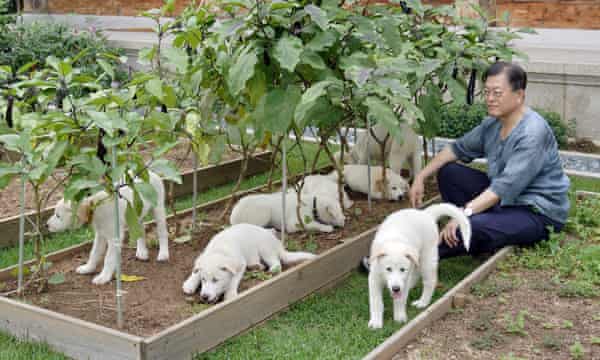Animals farmed: UK supply chain crisis, meat plant workers exploited and Billie Eilish’s Cop26 plea | Farming
New investigation from Animals farmed
We’ve been running a startling investigation into Europe’s multibillion-pound meat industry, revealing how it has become a global hotspot for outsourced labour, hiring thousands of workers through subcontractors, agencies and bogus co-operatives on inferior pay and conditions.
Journalists Ella McSweeney and Holly Young spent the past six months interviewing workers and insiders across the UK and EU. They report that thousands of workers in some countries – many of them migrants – are precariously employed, with some being paid 40% to 50% less than employees in the same factories.
“The system is sick everywhere across Europe. It’s based on cheap prices for meat, on the exploitation of labour,” Enrico Somaglia, deputy secretary general of the European Federation of Food, Agriculture and Tourism Trade Unions, told them.
The investigation has revealed how migrant workers prop up Ireland’s €4bn (£3.4bn) meat industry; explored conditions for temporary staff at meat plants in the Netherlands – Europe’s biggest meat exporter; and asked whether other countries would follow the lead of Denmark, which has secured decent pay and conditions within the sector.
News from around the world
An Italian farmer producing Grana Padano cheese has been fined almost €10,000 after an animal rights organisation released a video appearing to show “inconceivable conditions of neglect” allegedly taken at the dairy farm. The video prompted inspections by police and official veterinarians who found several violations of animal welfare regulations. In a statement, industry body the Grana Padano Protection Consortium said that, while by law animal welfare was not its responsibility, it had long been insisting that dairies apply best practice. The consortium added that the case was not representative of the Grana Padano production chain.
At least 651,000 farm animal deaths have been linked to the “heat dome” that settled over western Canada and the north-western US for five days in June – killing more than 500 people and contributing to wildfires. Although the weather event was unprecedented, animal welfare groups say more should have been done to protect animals. Industry bodies and farmers say producers are preparing for extreme heat events.
Consumers are being encouraged to buy different sized eggs after a study of laying hens uncovered a “huge animal welfare problem”. University of Copenhagen researchers examined 4,800 hens and found almost 4,100 had fractured keel bones (part of a bird’s breastbone). They concluded the fractures were due to hens being bred to be smaller while producing larger eggs, and that it was a global problem found in nearly all production systems – including among organic and free-range birds.

South Korea’s president, Moon Jae-in, has proposed banning the eating of dogs in the country, his office said. The meat has long been a part of South Korean cuisine, with about 1 million dogs believed to be eaten annually. But consumption has declined as a growing number of people live with dogs as pets – including the president – and the practice is something of a taboo among younger generations.
Farmers’ ownership of the word “meat” has been challenged at an Australian Senate inquiry into food labelling. The inquiry, chaired by senator and former butcher shop owner Susan McDonald, is examining whether labelling should be changed to better identify plant-based products. McDonald has said the makers of meat alternatives should not trade off long-established names of animal protein and should instead come up with their own terms.
News from the UK
The government announced it is to issue up to 10,500 temporary UK visas for lorry drivers and poultry workers in an attempt to ease the supply chain crisis. Pig farmers warned that supply chain issues could force them to “slaughter their own animals” to dispose of them – there have already been reports of on-farm culling.
Felicity Lawrence argued that ever-worsening conditions in supply chain jobs, such as abattoirs and meat plants, had made Britain’s shortages inevitable.
Changes to farming regulations that will allow field trials of gene edited crops in England were announced by the government. This will be followed by plans to allow greater use of gene editing in crops – and potentially animals too – in the UK.
A single case of BSE has been confirmed on a farm in Somerset. The infected animal was dead and had been removed from the farm, said the Animal and Plant Health Agency, which added that there had been five cases of confirmed BSE in the UK since 2014, all of which have been in animals not destined for the human food chain and posed no risk to the public.

Eighteen celebrities – including musician Billie Eilish and actor Alicia Silverstone – have signed a letter urging world leaders to address animal agriculture’s impact on the climate crisis at the Cop26 summit in Glasgow. Meanwhile, a Labour MP has claimed most livestock farming would be phased out over the next 20 years due to the necessity of meeting the UK’s net zero targets. The UK meat sector has made progress in its ambitions to reduce carbon emissions and food waste, according to a new report by the charity Wrap.
Share your stories and feedback
Thank you to everyone who has been in touch with their thoughts on the series. Many readers responded to our investigation into working conditions in Europe’s meat plants, including Peter Dempsey, who said: “You are probably familiar with The Jungle by Upton Sinclair, written over a century ago. Nothing has changed.” While another reader said: “The title of the series could be ‘people farmed’ actually.”
To air your views, or share your experiences and stories from inside the farming industry, please contact us at: animalsfarmed@theguardian.com.
And if you want to receive this Animals farmed monthly update via email, you can sign up here to get a roundup of the best farming and food stories across the world and keep up with our investigations.
Source: theguardian.com

